2017[中学联盟]江苏省仪征市实验中学英语九年级下册Unit 4 Period1(PPT).ppt
江苏省仪征市实验中学九年级英语下册 Unit 4 Life on Mars练习(无答案)(新版)牛津版
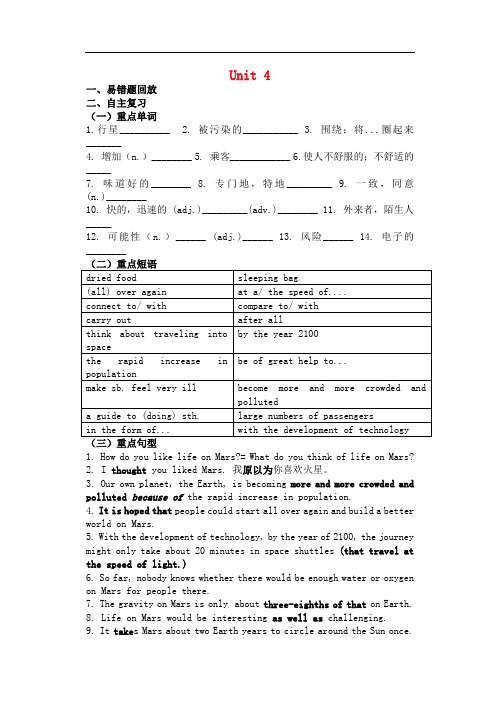
Unit 4一、易错题回放二、自主复习(一)重点单词1.行星__________2. 被污染的___________3. 围绕;将...圈起来_______4. 增加(n.)________5. 乘客____________6.使人不舒服的;不舒适的_____7. 味道好的________ 8. 专门地,特地_________ 9. 一致,同意(n.)________10. 快的,迅速的 (adj.)_________(adv.)________ 11. 外来者,陌生人_____12. 可能性(n.)______ (adj.)______ 13. 风险______ 14. 电子的________dried food sleeping bag(all) over again at a/ the speed of....connect to/ with compare to/ withcarry out after allby the year 2100think about traveling intospacebe of great help to...the rapid increase inpopulationmake sb. feel very ill become more and more crowded andpolluteda guide to (doing) sth. large numbers of passengersin the form of... with the development of technology1. How do you like life on Mars?= What do you think of life on Mars?2. I thought you liked Mars. 我原以为你喜欢火星。
3. Our own planet, the Earth, is becoming more and more crowded and polluted because of the rapid increase in population.4.It is hoped that people could start all over again and build a better world on Mars.5. With the development of technology, by the year of 2100, the journey might only take about 20 minutes in space shuttles (that travel at the speed of light.)6. So far, nobody knows whether there would be enough water or oxygen on Mars for people there.7. The gravity on Mars is only about three-eighths of that on Earth.8. Life on Mars would be interesting as well as challenging.9. It take s Mars about two Earth years to circle around the Sun once.10. I am not sure if it is worth the risk.三、语法知识点疏理 (简单句和复合句之间的转换)状语从句可通过介词短语转换成简单句,定语从句和宾语从句可通过介词转换成简单句。
人教英语九年级全册Unit4Section B 1a— 1e(共20张PPT)
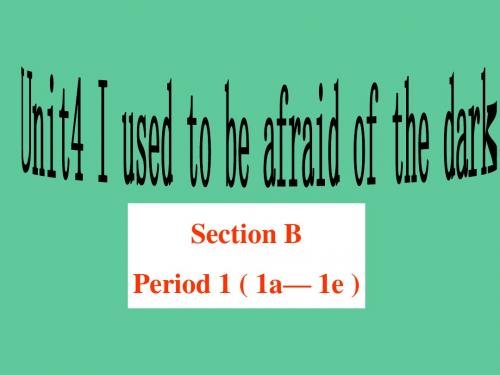
6. He often played football with his friends in the past.
Child,___d_id_n_’_t y_o_u___?
usedn’t you
insects
spider
ant
1 a Make sentences.
What other things did you use to like to do when you were a child? Write and then discuss them with a partner.
同义句转换。
1.He is scared of big dogs. He __i_s _ __a_fr_a_i_d_ ___o_f _ big dogs.
2. I have joined the school sports team. I _a_m___ __o_n__ the school sports team.
He __u_s_e_d_ ___to____ play football with his friends.
Girl We used to walkto school. We have totake thtoe sbcuhsool.
wear the school uniform
wear what we like
We used to play every We studyall the time.
Boy day after school.
新人教版九年级英语 unit4 period4-优质课件.ppt

4. be used to do 意为“被用来做……”,被动语态结构, to后跟动词原形。
5. be used for doing sth. 意为“被用来……”,介词for表示功能、 用途。
school. 5. 我不习惯午饭吃这么多。
I’m __n__o_t__ used to _e_a_t_i_n_g___ so much
at lunch time.
4a Write sentences about the past using used to.
1. Grace/watch a lot of TV/watch a lot of movies G__ra_c_e__u_s_e_d__to__w_a_t_c_h_a__lo__t _o_f_T_V_._S_h_e__d_id_n_’t u_s_e__t_o_w__a_tc_h__a_l_o_t_o_f_m__o_v_ie_s_.___________
(四) used to 的状语可以用副词always, often,sometimes等,但是仍然是过去的 习惯,不是指现在的习惯,所以不能用 一般现在时。
例如:He always used to be late for class. 他过去常常上课迟到。
(五) used to可以用在there be结构中表示 “过去经常有”的意思。 There used to be
Did he use to wear glasses? used to do sth. 表示过去习惯性的动作或存在的状态。 to后跟动词原形,只用于一般过去时态。
江苏省仪征市实验中学英语(牛津译林版)九年级下册:Unit 4 Period3
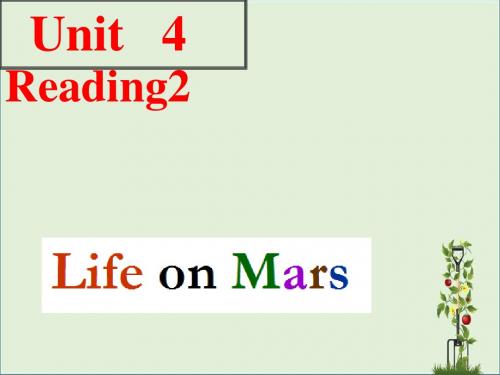
4. How long does the spacecraft need to get to Mars in the future ?
About 20 minutes. 5. What would food on Mars be like?
Large numbers of people go travelling during the National Day holiday.
(1)...too +adj.+ to do
=
... so ... that ...can’t ....
=
... adj. +enough to do ...
如果分子大于1, 分母要用复数形式。 如:
two thirds 三分之二 four fifths 五分之四 但是,1/2不能说a (one) second, 而 要说 a (one) half。1/4和3/4可以说 a (one) fourth 和 three fourths, 但常用 a quarter 和 three quarters表示。
根据汉语意思完成句子。 1. The bus was so _c_r_o_w_d_e_d__ (拥挤的) that I
didn’t get on it. 2. As we get nearer, the image bees
_b_ig_g_e_r__a_n_d_b_i_g_g_e_r_ (越来越大).
the number of ……的数目 后常接可数名词复数,做主语时,谓语动词常用单数形 式。 eg.The number of tourists starts to tail off in October.
江苏省仪征市实验中学九年级英语下册 Unit 1 Asia stu
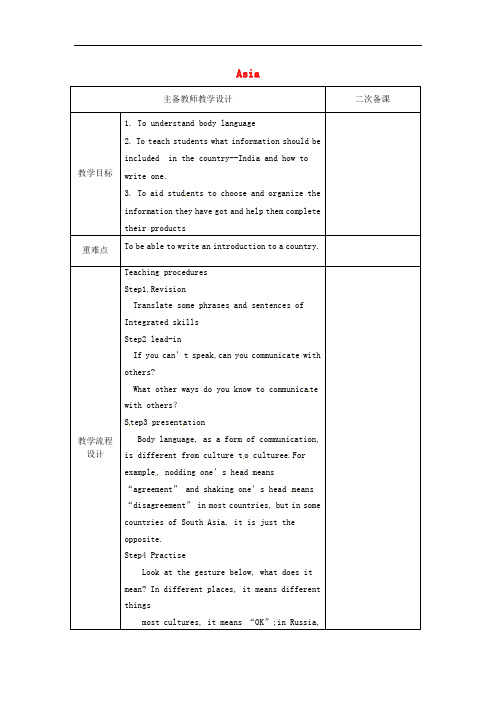
Asia主备教师教学设计二次备课教学目标1. To understand body language2. To teach students what information should be included in the country--India and how to write one.3. To aid stud ents to choose and organize the information they have got and help them complete their products重难点To be able to write an introduction to a country.教学流程设计Teaching proceduresStep1,RevisionTranslate some phrases and sentences of Integrated skillsStep2 lead-inIf you can’t speak,can you communicate with others?What other ways do you know to communica te with others?S tep3 presentationBody language, as a form of communication, is different from culture t o culturee.For example, nodding one’s head means “agreement” and shaking one’s head means “disagreement” in most countries,but in some countries of South Asia, it is just the opposite.Step4 PractiseLook at the gesture below, what does it mean? In different places, it means different thingsmost cultures, it means “OK”;in Russia,Brazil and Turkey, it is an insult; in France and Belgium, it means “zero” or “worthless”; in Japan, it means “money”. Body language possible meaning Head held down shy, ashamed Head raised confident Looking down dishonest Looking away bored, uninterestedLooking in the eyes friendly, interested, honestStep5 ConsolidationMatch the pictures with the meanings, write the correct letter in each box1I can do it2I did something wrong.3Glad to see youStep 6 Lead-inAsk students some questions related to the trip to Japan and SingaporeReview something special about the countries Get the Ss to learn about different flags about some countries and encourage them to san sth about themStep 7 PresentationGet the Ss to talk about sth about India--capital,location/language/crops/main industry/customs/attractions1)what is India’s capital city?2)What language do people there use3)What’s the population of the country?4)What crops are grown in the country?5)What attractions is the most famous?Step 8 Writing and analyzeAccomplish partB, dealing with some language points.Analyze the structure of the passage IndiaStep 9 Writing Get the Ss to write an article to introduce a country with the help of the useful words and expressions:…is a great country/wonderful place to visit It lies inIt is next toIts capital city is…People in ….speak …There are over …people thereIt’s famous for……is well known and worth a visitStep 10correcting &modifyingGet the Ss to correct it in groupModify the article and finish it教后记IntroductionLanguage,population&cropsCustoms Attractions。
【最新】人教版九年级英语 Unit4-SectionB1a--1c(共36张PPT).ppt
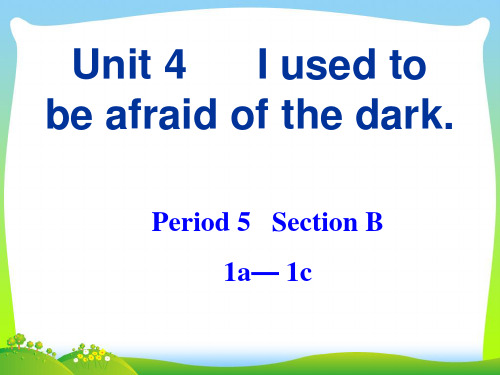
wear the school uniform wear what we like
Free Talk
You are in Grade 9 now. Is your life quite different from before?
Free Talk
What did your parents use to do when they were children? How is it different from what you do?
Unit 4 I used to be afraid of the dark.
Period 5 Section B 1a— 1c
Teaching aims
❖掌握本课生词ant,insect; ❖掌握本课短语; ❖运用“used to + 动词”的结构和第
一人称描述自己的过去和现在的爱 好及其变化;
Did you use(Used you) to like this when you
were a child? No, I didn’t. / No, I usedn’t.
P.E. class
Did you use(Used you) to like this when you
were a child? No, I didn’t. / No, I usedn’t.
We used to walk to
Girl school.
We have to take the bus
to school.
We used toplay
Bevoeyry day after school.
We study all the time.
I used to hateP..E class I love P.E. class.
江苏省仪征市月塘中学九年级英语下册《Unit 4 Great p
《Unit 4 Great people》教案Learning aims:1. To match pictures to words2. To recognize and understand vocabulary about famous people3. To learn more about some famous peopleLearning focus:Who do you think is the greatest person that has ever lived?H e’s the person who invented my favourite food.Learning procedures:1.Lead-in: There are many great people in the world. Ask students to name someof great people they know and say who they like best.2.Welcome to the unit:a.Present some pictures of famous people and ask students to guess what thesefamous people were.b.Present new vocabulary.c.Ask students why they can be famous people and introduce what they did tostudents.plete “welcome to the unit” in class. Students can work in pairs tocomplete the exercises.3.Comic strips:a. Play the tape and students listen to the tape to get the main idea.b. Students read after the tape twice.c. Ask some questions about the conversation.d. Students read it in pairs and act it out.e. Why do people admire great people? Discuss and take down notes. Homework:Recite the conversation in the comic.教学反思The second period :Reading(1)Learning aims:To become familiar with and appreciate biographical writing.To understand related details and information.To infer general meaning from pictures ,title and context.Learning focus:To infer general meaning from pictures ,title and contextLearning procedures:1.Background information:2.Explain the context. Simon is reading an article about a famous astronaut,Neil Armstrong. Ask students whether they know when the first man walked on the moon. Also ask them if they know the names of the first two men who walked on the moon. Tell students that they will learn more about men visiting the moon in the reading passage.3.Students listen to the recording for the first three paragraphs and thenread them after the tape again.4.Do True or False questions to check understanding of the first threeparagraphs.a.Neil Armstrong was born in the 1940s.b.He flew in an aero plane when he was six.c.The Gemini 8 mission is all about star signs.d.Gemini 8 landed in the USA.e.Neil Armstrong received his student pilot’s license when he was 15.f.Neil Armstrong successfully brought the spacecraft down into the westernPacific Ocean when Gemini 8 was out of control.g.Ask students to scan the first three parag raphs and underline the newwords. Encourage them to explain the words to the class in English.3.课堂整理:Language points:a. at the age of… =when sb was … years oldThe boy could swim at the age of 5.= The boy could swim w hen he was 5 years old.b. work as…He worked as a teacher when he finished school.c. better safe than sorry= it is wiser to be too careful than to act too quickly and do something that may be regretted later.d. order sb (not) to do sthThe commander ordered the soldiers to stand in line.The doctor ordered me not to work for a long time and have a good rest.e. cut sb/sth shortThe interviewer cut short his guest in mid-sentence.The third period:Reading(2)Learning aims:1. To identify specific meaning in different contexts.2. To check understanding by answering some questions.3. To consolidate the understanding of the passage.Learning focus:能够领会并熟练运用文中的语法。
九年级英语PPT课件 Unit4 period 4-2 SectionB 2a-2f
Discussion
What are these children's feelings with their parents away from home?
2a
Li Wen is a 15-year-old boy from the countryside. His parents are working in the city. Look at the title of the passage and the picture below. What problems do you think he might have?
a decision/decided Then his parents made ____________________ to send him to a boarding school. He found life there difficult. One day he told his teacher he wanted to leave the school. His teacher advised his parents to talk with their son in person. This changed/ influenced his conversation __________________ life.
Li Wen is a 15-year-old boy. He works hard and does well in school. It is hard to believe that he used to have difficulties in school. When his parents moved to the city to work, they could not be at home to look _____________________him. So after/ take care of he became less interested in studying and _____________________ missed/ was absent fromclasses.
江苏省仪征市实验中学英语(牛津译林版)九年级下册:Unit 4Period5-6
Daniel wants to live on Mars in the future. However, Sandy is still not sure if she would like to. This week, there is a TV programme on this topic. Listen to the preview. Help Sandy make notes of it.
Daniel and Sandy are talking about the TV programme. plete their conversation with the information in Parts A 1 and A 2.
Sandy: Did you watch the programme called (1) M__o_v_e__in__M__a_rs_ on (2) _S_u_n_s_h_i_n_e TV last (3) F_r_i_d_a_y_ evening? Daniel: Yes, I did. but I missed the first part of it. When did the programme begin? Sandy: It began at _7_:3_0__p_.m__.. It started with a discussion about a s_u_r_v_e_y_. It showed that (6) _5_0_%__ of the students would like to (7) m__o_v_e_a_w__a_y_f_r_o_m_ the Earth and live on (8) _M_a_r_s_.
Advantages 1. It would be very interesting. 2. We could study at _o_n_li_n_e_s_c_h_o_o_l_s. 3. It is not so crowded, with much more
江苏省仪征市月塘中学九年级英语下册《Unit4Greatpeople》导学案(无答案)牛津版
《Unit 4 Great people 》导学案 9B UiriM Gi pat ppopk The fii/f period :Coiiiic ship
Lear ning aims: 1. To match pictures to words
2. To recog nize and un dersta nd vocabulary about famous people 3. To lear n more about some famous people Lear ning focus: Who do you think is the greatest pers on that has ever lived? He' s the pers on who inven ted my favourite food. Lear ning procedures: 1. 自学展示:
将下列词组译成英语。 1).伟人 _________________ 2). 听说 ______________________
3).在月球上行走 _____________ 4). 摇滚乐之王 _______________________
5).使。。。。。。流行 _________ 6). 关爱;关心 ______________________
7).花费时间做某事 ____________ 8). ______ 发现美洲大陆 ____________________________
9).世界杯 _____________ 10). ____ 在西方世界 _____________________________
2 •探究学习
1. Lead-in: There are many great people in the world. Ask students to name some of great people
